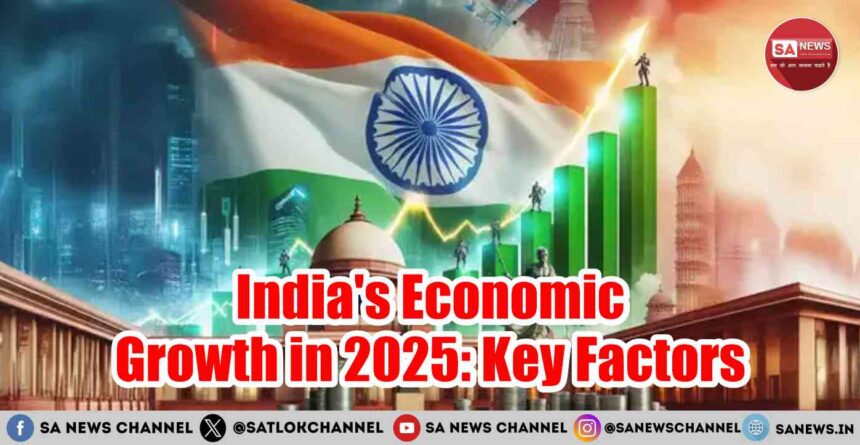The year 2025 will be crucial to India’s progress toward becoming a global economic powerhouse. India’s growth path will be influenced by significant factors like digital transformation, infrastructure expansion, and policy reforms in the year 2025. However, careful maneuvering is required for issues such as inflation, job creation, and global uncertainty. The prospects for India’s economic growth in 2025 are examined in this article.
- Key Highlights on India’s Economic Growth in 2025
- In 2025, India’s economy is expected to expand significantly.
- 1. The Reasons for India’s Economic Expansion.
- 2. Massive initiatives
- 3. Global Trade and Foreign Direct Investment (FDI).
- 4. Economic Reforms and Policies of the Government
- 5.Initiatives for the Green Economy and Sustainability
- 2025 & Beyond: Why India’s Economic Success Needs Ethical Foundations
- Frequently Asked Questions (FAQs)
Key Highlights on India’s Economic Growth in 2025
- India’s economy is expected to witness significant expansion in 2025.
- Digital transformation and technology innovations are key growth drivers.
- Massive infrastructure initiatives, including high-speed rail and smart cities, will reshape the landscape.
- Increased global trade and foreign direct investments will boost sectors like manufacturing and e-commerce.
- Economic reforms, including tax rationalization and streamlined business operations, will enhance the business climate.
- Initiatives focused on green energy and sustainability are set to attract investments and create new job opportunities.
In 2025, India’s economy is expected to expand significantly.
Digitalization, improved infrastructure, and investments from abroad are all important drivers. Inflation, unemployment, and shifts in the global economy are among the obstacles. The future is significantly influenced by initiatives and policy shifts. Green energy and sustainability are becoming increasingly important economic factors. Sections with Headings The Economic Landscape of India in 2025:
It is anticipated that India, which has one of the fastest growing economies in the world, will make significant progress by 2025.
Also Read: GST: A Revolution in India’s Tax System
Understanding the primary drivers and potential obstacles becomes critical as domestic and international factors interact.
1. The Reasons for India’s Economic Expansion.
Innovations in digital transformation and technology AI, automation, and widespread internet access are driving India’s rapid digital economy expansion. Startups and IT services continue to play a significant role in GDP expansion.
2. Massive initiatives
Massive initiatives like high-speed rail, smart cities, urbanization, and infrastructure development are reshaping India’s economy. GDP growth will be significantly impacted by the expansion of both public and private infrastructure investments.
3. Global Trade and Foreign Direct Investment (FDI).
India’s high growth rates in manufacturing, pharmaceuticals, and e-commerce continue to make it a desirable location for foreign investments. Partnerships and trade agreements around the world will help the economy grow even more.
4. Economic Reforms and Policies of the Government
The business climate is anticipated to improve as a result of efforts to simplify business operations, rationalize taxes, and reforms to PLI (Production Linked Incentives).
5.Initiatives for the Green Economy and Sustainability
It is anticipated that India’s transition to a green economy, which places an emphasis on sustainable manufacturing, clean energy, and electric vehicles, will attract investments from all over the world and create new employment opportunities.
- Impediments to India’s Economic Expansion in 2025 Supply chain disruptions, global economic instability, and rising fuel prices are all potential causes of inflation, which can affect consumers’ ability to buy things.
- The creation of new jobs remains a challenge despite the economy’s expansion. Reforms in vocational education and education are required to close the skill gap.
- India’s growth trajectory could be affected by oil price fluctuations, geopolitical tensions, and the possibility of global recessions.
- Stability in the Financial Sector The state of India’s banking industry, the rising number of non-performing assets (NPAs), and financial regulations will all have a big effect on the long-term viability of the economy. In the years to come, where will India go? Experts predict that innovation and robust domestic consumption will continue to drive India’s economy’s expansion. The rate of growth, on the other hand, will be determined by policy implementation, strategic planning, and global stability.
2025 & Beyond: Why India’s Economic Success Needs Ethical Foundations
India’s economic growth in 2025 will be shaped by digital transformation, infrastructure expansion, and policy reforms. While the nation moves toward becoming a global economic powerhouse, challenges such as inflation, job creation, and global uncertainties require careful handling. Sustainable development, foreign investments, and government initiatives will play a significant role in shaping the future.
However, true progress is not just measured by economic prosperity but also by societal well-being and ethical governance. Sant Rampal Ji Maharaj Ji emphasizes that material success alone cannot bring lasting happiness or stability. Economic policies should align with ethical values, ensuring fairness, integrity, and equal opportunities for all. A society rooted in spiritual wisdom fosters honesty in business, reduces corruption, and promotes harmonious growth.
By integrating spirituality with economic planning, India can achieve holistic development—where financial progress goes hand in hand with social justice, sustainability, and moral responsibility. Following God’s Constitution, as explained by Sant Rampal Ji Maharaj, can help create a just and balanced society, ensuring that prosperity benefits everyone, not just a select few. Only when economic policies are built on ethical and spiritual foundations can India truly emerge as a global leader in both wealth and wisdom.
Frequently Asked Questions (FAQs)
1. In 2025, what will drive India’s economic expansion?
Digital transformation, the development of infrastructure, foreign investments, and government policies are all important drivers.
2. In 2025, what are the most pressing issues that could affect India’s economy?
Significant obstacles include inflation, unemployment, global uncertainty, and the stability of the financial sector.
3. How does India respond to changes in the global economy?
India is preparing for long-term growth by reforming its policies, negotiating trade agreements, investing in green technology and energy, and negotiating trade agreements.
4. In 2025, will India’s growth be inclusive?
With an emphasis on rural development and job creation, gaps in the economy are being filled.
5. How does spirituality contribute to financial success?
Moral business practices, mental peace, and a balanced life are all encouraged by spiritual values, which contribute to overall well-being and economic stability.








